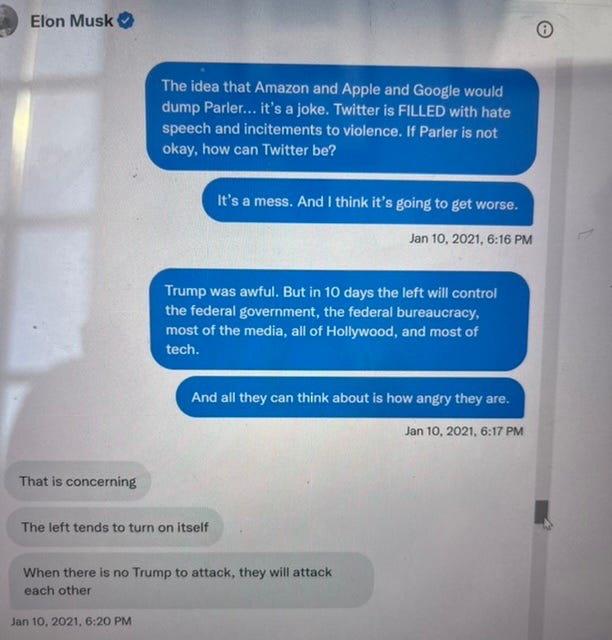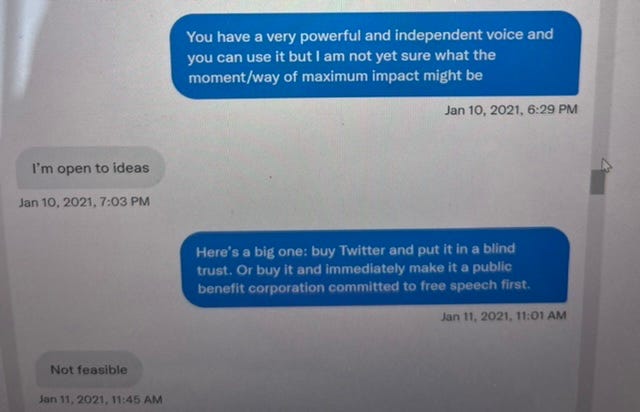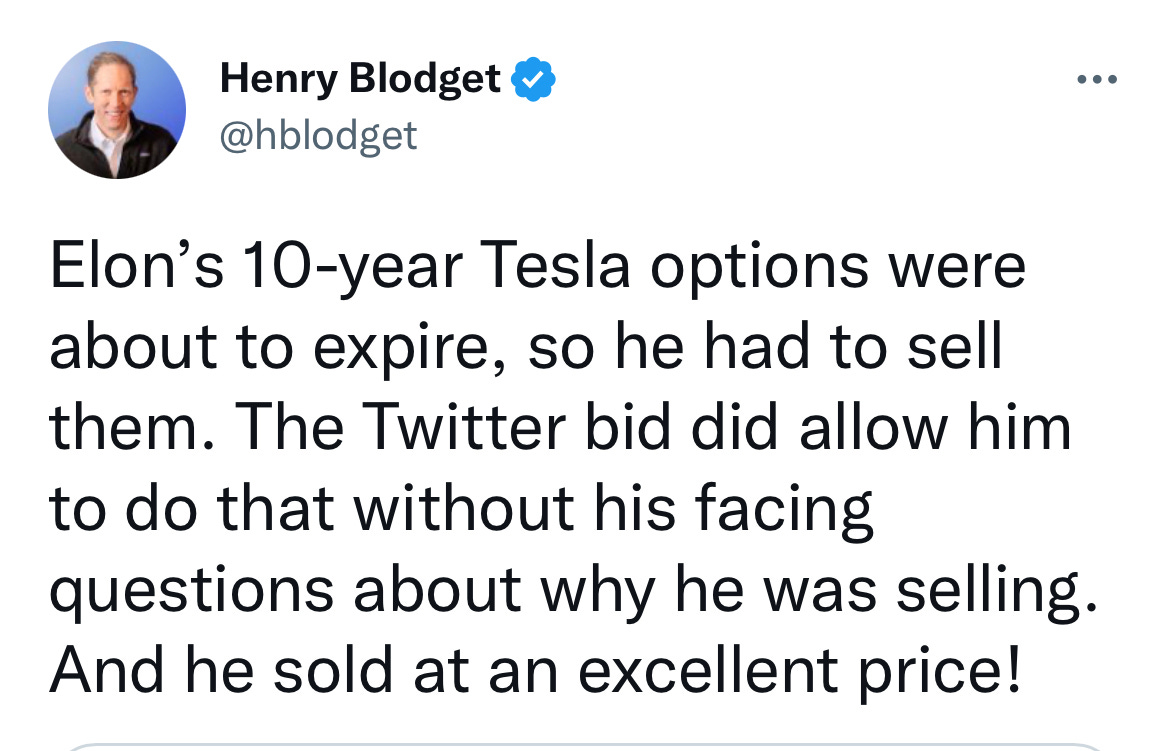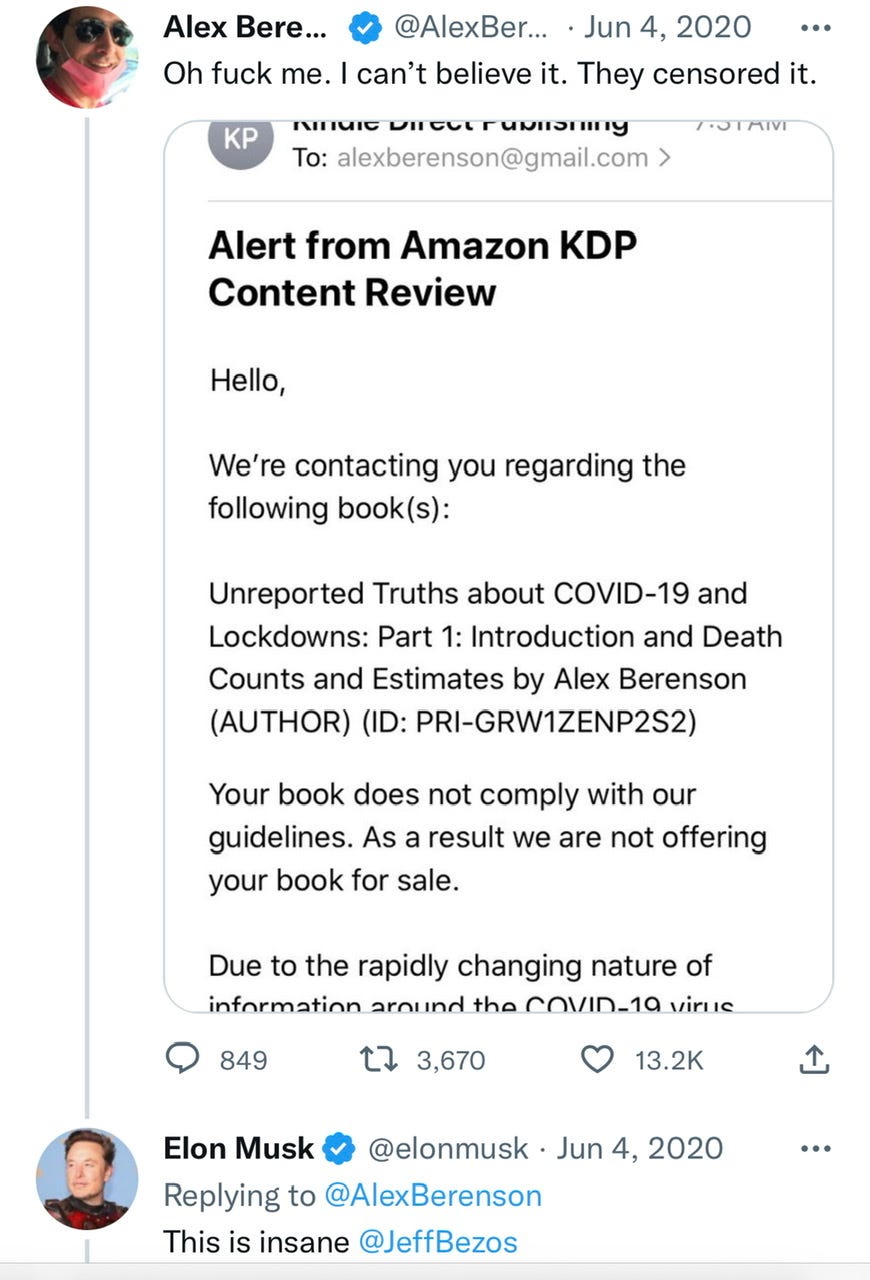The incredible disappointment of Elon Musk's first weeks owning Twitter (PART ONE)
I thought he'd bought the platform because he believed in free speech and debate; now I'm not so sure
Almost two years ago, I suggested to Elon Musk that he buy Twitter.
We’d talked since May 2020, when we discussed setting up an independent news site to report about Covid and the lunacy of lockdowns. (During that crazy month, Musk repeatedly offered to wire me money for the site. I declined - I wasn’t sure how I could up an independent board or hire reporters with the lockdowns raging. Yes, I am the only person in the world stupid enough to turn down money from Elon Musk.)
But we stayed in occasional contact. He earned my gratitude - forever - by helping convince Amazon to unban the first Unreported Truths booklet in June 2020. And in January 2021, Musk and I were chatting (over Twitter, inevitably) about the worsening threat to free speech. Twitter had just banned Donald Trump.
In a move that received less attention but was arguably more dangerous long-term, Amazon and Google and Apple were in the process of colluding to destroy Parler, a would-be conservative competitor to Twitter. The tech companies claimed that Parler was too full of hate speech to survive even as an app on their platforms, a bizarre argument to anyone who has spent any time trolling the darker recesses of Twitter.
So what to do?
“Buy Twitter and put it in a blind trust,” I suggested. “Or make it a public benefit corporation committed to free speech first.”
“Not feasible,” Musk replied. He had other priorities - notably importing human consciousness into robots and putting humans on Mars. Plus he had two huge companies, Tesla and SpaceX, to run - and what might be called an active social life to boot
—
That was that. So I thought. I went back to writing about lockdowns and - more and more - about vaccines, until finally I angered the powers that be so much that they booted me off Twitter.
But what Musk could consider “feasible” was changing almost daily. Shares in Tesla, Musk’s electric vehicle company, were in the middle of a rocket ride that took it from under $30 a share at the start of 2020 (adjusted for splits) to over $350 two years later.
Musk’s wealth soared in tandem. He went from being just a really, really rich guy - worth about $20 billion when the pandemic began - to the richest man in the world, with a fortune of $250 billion, an unimaginable figure, national-level wealth.
His public profile rose too, online and off.
Musk had always been a genius at winning publicity for himself and Tesla, dating beautiful women and getting high with Joe Rogan.
He was not exactly relatable - he was much too rich and too smart and too strange to be relatable - but he was visible, and he said what he was thinking. One could imagine having a beer with Musk, or maybe ripping a couple of bong hits, in a way that was impossible with Mark Zuckerberg or Jeff Bezos or the other Silicon Valley titans. His soaring wealth supercharged interest in him; he went from 17 million Twitter followers at the start to almost 100 million by early 2022. He understood Twitter’s power better than almost anyone.
—
(PRETTY PLEASE WITH FREE SPEECH ON TOP)
—
Yet the economic and societal impact of Musk’s companies was and is smaller than his net worth or public profile suggest.
Jeff Bezos’s Amazon employs 1.5 million people, has revolutionized retailing worldwide and is arguably the most powerful media company in the world too. Google has made unimaginably vast stores of information available to anyone with an Internet connection and is now devising artificial intelligence tools that humans can barely understand, much less control.
Despite its gargantuan market capitalization, Tesla was and is a niche car company. More than a decade after their introduction, electric vehicles remain a marginal product nowhere close to displacing gasoline-powered ones. And the last few months have not been good for Tesla, as the war in Ukraine has shown just how dependent on carbon fuels our electric grid remains. At the same time, legacy car companies have introduced electric cars that are increasingly competitive with Tesla’s, although Tesla’s brand is unmatched and it sells far more electrics than anyone else.
SpaceX, Musk’s other major company, makes rockets and is building a satellite Internet service, businesses that are supercool but have little relevance to daily life in any developed country. And SpaceX isn’t even very big at this point. It has 12,000 employees - one-tenth as many as Boeing.
Yet Musk’s brilliant track record and promotional skills have given SpaceX a huge given its actual size, more than $125 billion as of this spring. Musk owns nearly half the company, so all by itself his SpaceX stake is worth close to $60 billion and would make him one of the richest people in the world (though it is not clear how much of it he could sell or at what price).
—
None of this is to say that Tesla and SpaceX are not extraordinary companies and achievements, only that for now their market valuations outstrip their societal impact. Tesla is not Google, though for a while it was worth almost as much.
Maybe in a few years, Musk’s companies will prove investors correct and become as important as their capitalizations suggest - or maybe their valuations will shrink. Only time will tell.
But at some point in late 2021 or early 2022, Musk must have realized buying Twitter would give him chance to reach entirely new heights of societal influence. Let other billionaires have their own football teams or superyachts or private islands.
Musk would have his own social media company, used by hundreds of millions of people every day. He would put himself, in the words of Tour de France, “hors categorie” -beyond categorization.
(Leader of the pack)
—
Buying Twitter would also give Musk a good excuse to sell tens of billions of dollars in Tesla stock at extraordinary prices.
—
So Twitter made a perfect target for Musk.
He just needed a good reason to buy it.
I do not doubt that the hard-left turn the Democratic Party has taken in the last few years genuinely disgusts Musk. He understood from early on that public health bureaucrats had overstated Covid’s threat. Unlike most chief executives he was not afraid to say so publicly, despite the media shrieking that ensued.
The left’s attacks on his wealth and occasional threats to confiscate it also understandably anger him. His move of Tesla’s headquarters from California to Texas showed just how sick of anti-growth liberal policies he has become.
But what about his views on free speech? Overt censorship and cancel culture definitely bother Musk, as his response to Amazon’s decision to ban my book proved:
—
But even before Musk bought Twitter, he’d shown warning signs he might not be the First Amendment absolutist those of us who had faced social media censorship in the last several years had hoped.
Through Tesla, he was deeply tied to China, which has used advanced technology to crack down on dissent more effectively than any other country. He had also aggressively chased would-be whistleblowers at Tesla, in one case forcing one to repay the company $400,000 for “leaking confidential information to a reporter.” His SpaceX launches American military satellites, among the most highly classified programs in the United States military.
Nonethless, with Twitter’s censorship of dissenting views - around Covid countermeasures, mRNA vaccines, “civic integrity,” and trans rights, to name just a few - becoming more aggressive almost by the day, Musk’s $44 billion takeover seemed like a path to freedom.
Then the deal closed.
(END OF PART ONE)









There is no savior.
Free speech is up to us.
All I can say is educate those you know WHY it is so important.
Do not fear speaking your mind. This is the fight of our generation.
Get after it.
It's still early yet. Running Twitter and making it profitable is a complicated thing. There's no manual. But there's no doubt the platform is in better hands. Musk has thoroughly cleaned house; all the little censorious wannabe Bolsheviks have already left or are on their way out.